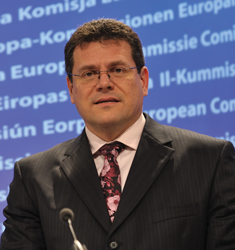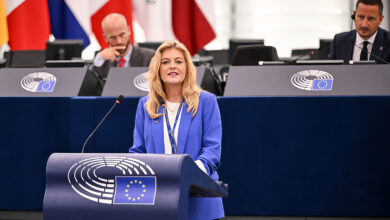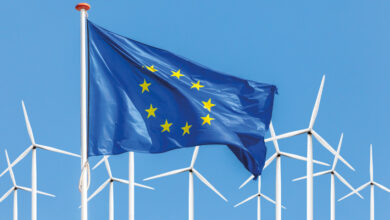Parliaments in Europe: Maroš Šefčovič
 Europe’s national parliaments have a key role in holding the Commission and governments to account for EU policy decisions. Commissioner for Inter-Institutional Relations Maroš Šefčovič describes this role and claims that ‘more Europe’ does not threaten sovereignty.
Europe’s national parliaments have a key role in holding the Commission and governments to account for EU policy decisions. Commissioner for Inter-Institutional Relations Maroš Šefčovič describes this role and claims that ‘more Europe’ does not threaten sovereignty.
National parliaments are, in many ways, the silent partner in the EU decision-making process. Although their role may not seem as clearly defined as that of the European Commission (as the initiator of legislation), Parliament or Council (as co-legislators), they are nonetheless increasingly important players on the EU stage.
The Lisbon Treaty gave them a specific responsibility for protecting the principles of subsidiarity (assessing whether legislation is better at European, national, regional or local level) and proportionality (making sure that EU action does not go beyond what is necessary to achieve the objectives of the treaty).
In practical terms, this means that most new legislative proposals from the Commission are scrutinised and assessed at a very early stage by national parliaments, whose members are directly elected by European citizens. This is a vital connection between ‘Brussels’ and the people that the EU is there to serve, a small but significant step towards bridging the so-called democratic deficit.
As the European Commissioner responsible for relations with national parliaments, I am often fortunate to see this commitment to European policy-making at first hand, and I’m always struck by how dedicated national politicians are when it comes to dealing with EU affairs. Since 2006, when political dialogue between the Commission and national parliaments began in earnest, national politicians have voiced their concerns and given their support to hundreds of legislative proposals, long before they came into force.
The topics vary widely. In Ireland’s case, these have ranged from issues such as quality marks for agricultural and food products to the future of the Common Fisheries Policy, as well as the Europe 2020 strategy for jobs and growth, the European Citizens’ Initiative and the proposed common consolidated corporate tax base.
But for me, the role of national parliaments goes far beyond this commitment to scrutiny and discussion of legislative proposals. Their role in the current climate of crisis management, fiscal consolidation and austerity – and one that I have encouraged them to play to the full in my many visits to national capitals over the last two years, including during my recent visit to the Oireachtas – must also be to ensure that their governments meet their commitments at the European level.
Broken promises
How many times have we seen governments agree to one thing in Brussels and then conveniently ignore it when they get back home? Take the recent spring European Council, for example. There, all member states agreed on measures to stimulate growth and competitiveness, including completing the single market – a measure to which they had all already agreed before. I hope that national parliaments, including the Oireachtas, will make sure that, this time, the proposals agreed in Brussels actually make it through to the statute book back home.
One of the main reasons why I believe we are facing the current economic and financial crisis is because governments have chosen to act alone, rather than recognising that, whether they are in the euro zone or not, all of Europe’s economies are inextricably linked and dependent upon each other.
Thankfully, the European institutions have taken the necessary action to tackle the crisis and, as the recent spring European Council meeting showed, we are focusing our efforts once again on promoting growth rather than crisis management.
Everyone agrees that the strategies we have put in place will work but they must be fully implemented for this to happen. Europe 2020 will deliver smart, sustainable and inclusive growth in the EU by 2020 – but we are already two years into this strategy and it’s only eight years to 2020.
Full implementation of the Services Directive could increase trade in commercial services by 45 per cent and foreign direct investment by around 20 per cent. The European patent is currently blocked in the Council because three member states cannot agree on which country will host the new patent court, yet this would reduce patenting costs by 80 per cent.
That is why we need national parliaments: to ensure that governments keep their promises and that they implement the measures which everyone agrees are necessary for the whole of the EU to prosper once again. In short, we need national parliaments to play a more European role, a phenomenon that European Council President Herman Van Rompuy described recently as “the Europeanisation of national political life”. In short, we need more Europe.
But more Europe doesn’t mean less national sovereignty. Take, for example, the proposals from the European Commission to monitor and assess draft budgets. Some national parliaments have expressed their concern that this will lead to all national budgets being approved by the European Commission.
This could not be further from the truth. National budgets will continue, quite rightly, to be agreed and adopted by national parliaments. The Commission will simply ensure that those national parliaments are better informed of the European rules that their budget must follow and what impact their budgetary proposals might have on the rest of the EU.
This Europeanisation of national debates can only be beneficial for Europe as a whole, and I for one look forward to taking part in more such debates as I continue my visits to national parliaments in the years to come.
|
Maroš Šefčovič, a Slovak economist and diplomat, has been a Vice-President of the European Commission (one of eight) since February 2010 and is a member of his country’s Social Democratic Party. His full remit is inter-institutional relations and administration. He previously held the Commission’s education, training, culture and youth remit (2009-2010) and was Slovakia’s Ambassador to the EU (2004-2009). |





